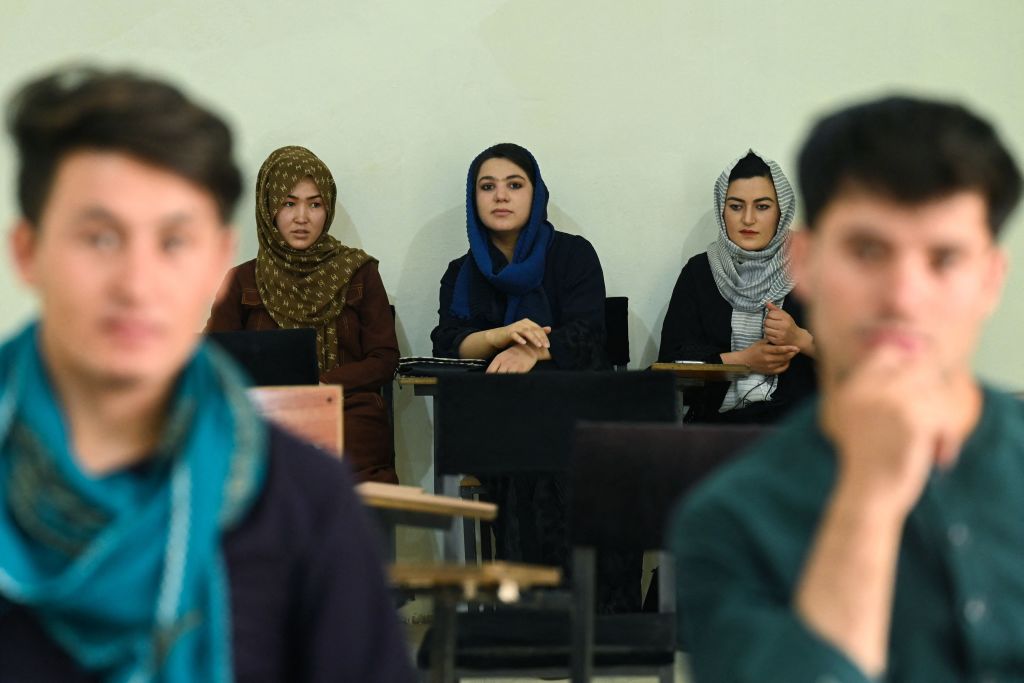Editor’s note: This story was produced in partnership with Rukhshana Media and is part of The Fuller Project’s ongoing series, “Ending America’s Forever War: What is next for Afghan women?”, documenting what the end of America’s longest war on foreign soil means for the women who have lived through it. Follow The Fuller Project’s continuing coverage here.
One day before the fall of Kabul, I attended a university preparation course, and I couldn’t have imagined that the circumstances would change so quickly. The day Kabul fell, I was in total shock for two days and followed the news on social media in complete disbelief. I was so stressed that I couldn’t sleep. I was sad and just cried.
Our course remained off for two weeks after the fall of Kabul. In the third week, when it resumed, I was one of the first students to return to class. Many of my friends didn’t return because their parents would not allow them to continue. The parents of one of my friends had warned her that it was dangerous.
I was born two years after the fall of the Taliban in 2001. However, I have always felt the Taliban’s evil shadow in my life. In recent years, every time I left home, I always feared being killed in a suicide bombing. I have experienced this horror up close, twice.
‘You are our hope for a better tomorrow’
The first time was in April 2018, when ISIS targeted the Population Registration Department in Dasht-e-Barchi. More than 50 people were killed, and more than 100 people were injured. Our school was located in the street behind this office, and I was in class that day. Our class was on the second floor, so when the explosion happened, our classroom shook severely. We all thought that the bomb had exploded inside the school.
We all screamed, and two of my classmates fainted. Another one was in shock and stared at a specific point. She did not respond when we called her name. A classmate slapped her in the face. When she regained consciousness, we all ran downstairs. All the students assembled in the schoolyard. When we managed to get out, the street was full of ambulances, police cars and mothers who had cried their eyes out waiting for their children. My younger sister, who was in the ninth grade, was shocked, and one of her eyes had been hurt, which took six months to recover.
The second time, three months later, there was an attack on Maw’ood Education Center, where I was taking university entrance preparation courses. The attack killed at least 50 people and injured more than 70 others. That day, I arrived late to class because my sister was late in preparing lunch. As soon as I got out of the car, I heard the sound of an explosion. For a moment, I could not understand what had happened — until I saw a young boy running out of the education center with an injured leg. Next, I saw two men carrying a wounded girl. I felt panic in my body, and my phone started ringing. The first call was my mother’s. In a trembling voice, she asked, “Are you okay?”
When I came out of those attacks alive, my father said, “It is more meaningful to die in pursuit of education than to remain illiterate. Continue studying, my daughter, go on. You are our hope for a better tomorrow. If one day a woman becomes president of Afghanistan, that day our country will prosper.”
Related coverage: ‘I Went Out and Shouted for Freedom’
My father wanted me to get an education and become a politician one day. He does not have a solid job, so he cannot support our family alone. My mother was working at a pharmaceutical packaging company. One month before the Taliban took over our country, I found a job with a garment company that provided work uniforms for the presidential palace employees. However, since the Taliban took over, our lives have been turned upside down. Currently, no one in our family of eight works outside the home. I sew at home for a sewing company, making about six wedding dresses per month.
But I want to continue my education. For this reason, I have persuaded my family to allow me to retake a university entrance preparation course. However, it’s pointless to prepare for the exam when we (girls) are not allowed to go to university. These days, when I go to the education center to attend my class, all the men passing by threaten me with the Taliban, asking, “Where is your burqa?”
A few days ago, I learned that the Taliban had killed a woman in our neighboring area. I am afraid of being killed. I grew up in Kabul and flourished in its streets, and I would have never imagined that I would be afraid of exploring my own city one day.
Nafiza (a pseudonym), 19, is a tailor. Translation by Sahar Fetrat.


 Nafiza
Nafiza
